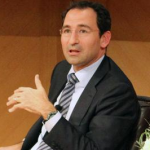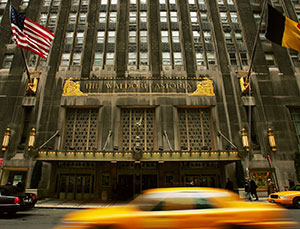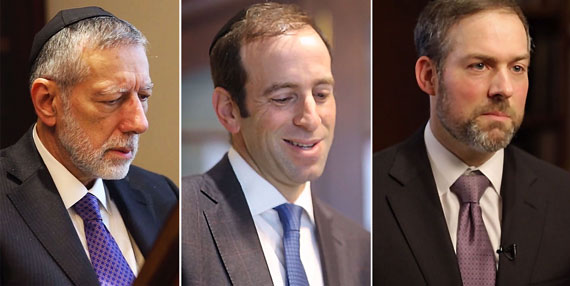New York City has, for quite some time, been the world’s most dynamic and high-stakes real estate market. But 2015 pushed all the elements that make it so fascinating — its price points, its global appeal, its megadeals, and the chutzpah of the players involved — to a new level.
The Real Deal had a ringside seat to the year’s biggest stories, which dove into themes such as the luxury residential market, real estate technology, multibillion-dollar startups, the growing investor appetite for rental housing, the explosive growth of WeWork, and, of course, a certain loudmouth mogul with a bouffant.
Read on for more.

From left: 220 Central Park South, 520 Park Avenue and One57
One57’s record-breaking deal and the rise of the $100M+ penthouse
The year started off on a strong note, when a mystery buyer closed on a $100.5 million penthouse at Gary Barnett’s One57. The unit smashed New York’s previous $88 million record, set at 15 Central Park West, and ushered in the age of the triple-digit price tag. (No word on how long this record will hold, however — hedge funder Ken Griffin is reportedly paying north of $200 million for a spread at 220 Central Park South.)
On the heels of the One57 deal, TRD reported the Chetrit Group would ask $150 million for the triplex penthouse at its Sony Building conversion. The apartment at 550 Madison Avenue is set to take the cake as the most expensive listing in New York City (and its biggest, at 21,000 square feet.) And other developers followed suit: The Zeckendorf brothers are asking $130 million for a triplex penthouse at 520 Park Avenue, JDS Development Group and Property Markets Group are reportedly going to launch $100 million-plus penthouses at 111 West 57th Street, and even Ben Shaoul’s Magnum Real Estate Group is mulling a seven-figure ask at his redevelopment of the Verizon building at 140 West Street.
Whether there’s sufficient demand for these larger-than-life listings is another matter. An “imperfect” data dive by TRD in June suggested that there may not be enough ultra-high-net-worth buyers for the city’s uber-luxury condos, specifically in New York City. Only time and the fate of Billionaires’ Row will tell.
Listen to the reporters behind the story discussing it on the Brian Lehrer Show.
Stuyvesant Town and the hegemony of Blackstone
In 2006, Tishman Speyer and BlackRock made a $5.4 billion deal for Stuyvesant Town-Peter Cooper Village that became the poster child for the greed of the housing boom and ultimately ended up in them defaulting on the property. The sprawling 11,200-unit complex right off the East River was bogged down in litigation ever since. But in October, the Blackstone Group and Canadian investment fund Ivanhoe Cambridge agreed it to buy it for about $5.3 billion, and struck a deal with the city to keep 5,000 of the complex’s units affordable for at least 20 years. TRD went behind the scenes of the megadeal, which closed in December.


Jonathan Gray
The deal wrapped up a banner year for two incredibly prolific real estate funds. Blackstone, the country’s largest private landlord, raised a record-breaking $15.8 billion in addition to making several other megadeals, including one for General Electric’s real estate portfolio and a $700 million deal for the Caiola rental portfolio. And in February, Ivanhoe Cambridge Acquired 1095 Sixth Avenue, also known as 3 Bryant Park, from Blackstone for $2.2 billion. It was the country’s second-largest single-building transaction of the year, until SL Green Realty paid $2.3 billion (plus $300 million in lease-stipulated improvements) for 11 Madison Avenue in August.
The new Silk Road: Chinese investors dominate
The Big Apple is increasingly seen as a safe bet by investors across the globe, and 2015 was undoubtedly “The Year of the Chinese Investor,” as TRD reported in our March cover story.

The Waldorf Astoria
As China’s economy continues to cool, real estate players from the country are throwing their money into major deals around New York City. Some of the city’s biggest deals, including a $1.95 billion acquisition of the iconic Waldorf Astoria hotel, were pulled off by Chinese investors.
Much of the activity from China is fueled by the popular — yet controversial — EB-5 visa program, which grants wealthy foreigners green cards in exchange for a $500,000 investment and the creation of 10 U.S. jobs. The program, which has helped fund projects like Hudson Yards and Pacific Park, was extended for a year with no changes in December, despite criticism that it lacks sufficient oversight and is a giveaway to developers.
Rumble in the Bronx
Bypassed for years by the same developers and investors who are now placing their bets on the borough, the Bronx saw an influx of $1.2 billion worth of real estate investment in 2014. If projections for 2015 hold up, it could see 8,000 new residential units hit the market.
Some developers see the Bronx as the last bastion for development, and many small and mid-size players are testing the waters there. Established giants such as the Related Companies have been in the borough for years, but are increasing their investments.
The view from up here: Where are we in the cycle?
 As deals, projects, price tags and investments across the city grew larger and larger, many industry insiders are beginning to wonder how high the market can possibly rise before things take a turn for the worse — or at least, if the current cycle is approaching its peak.
As deals, projects, price tags and investments across the city grew larger and larger, many industry insiders are beginning to wonder how high the market can possibly rise before things take a turn for the worse — or at least, if the current cycle is approaching its peak.
TRD’s April story “When will the boom break?” found that despite some softening at the higher-end of the market, economists said the current boom is being built on a more solid foundation — that compared with past cycles, prices are rising at a steadier rate. Rather than “fast and loose credit” driving steep home gains, today’s increases are a result of an inventory shortage caused by tighter lending standards.
And while we may not be headed straight from boom to gloom, the market could very well be at or nearing the very top. Miller Samuel’s Jonathan Miller described the state of play in the residential market as a “high plateau” — not quite a peak, but unsustainable given the lack of buyers who can afford super-pricey Manhattan purchases.
Here be unicorns: Airbnb and WeWork
Venture capital investment in the real estate industry reached dizzying heights in 2015, and the biggest beneficiaries were two products of the “sharing economy” school.

Adam Neumann and Miguel McKelvey
WeWork doubled its value from $5 billion to $10 billion in just six months, making it the industry’s equivalent of Jamaican sprinter Usain Bolt. The coworking space giant is one of New York City’s largest (and by far its fastest-growing) office tenants, and in an in-depth feature story in June, TRD examined whether the company could survive a downturn.
Airbnb raised $1.5 billion in one of the largest private-funding rounds ever in June, valuing the home-sharing site at a staggering $25.5 billion. But just as big as its pocketbook is the controversy it has created in New York City, with the startup facing a ton of heat from lawmakers, landlords and the powerful hotel industry.

Airbnb founders Brian Chesky, Joe Gebbia and Nathan Blecharczyk
An analysis by TRD in October found that Airbnb drives up rents in some of the city’s hottest neighborhoods. Hosts who use the platform to run de facto hotels are taking hundreds of rental units off the market, putting upward pressure on rents and deepening the city’s housing crisis.
Some of the city’s biggest landlords, however, appear willing to play ball with the firm.
Compass vs. everyone

Robert Reffkin
Another beneficiary of venture capital was residential brokerage Compass, which soared to an $800 million valuation in September and continued to expand rapidly in New York and in other national markets by poaching some marquee talent from competitors such as Douglas Elliman, Brown Harris Stevens and the Corcoran Group.
Not that these firms took kindly to this empire-building. After losing 51 agents to the brokerage, Corcoran took Compass to court in March, citing “unlawful methods” of recruiting. Hamptons brokerage Saunders & Associates also waged war with the firm, alleging that it stole data from its listings database.
The quiet giants: Schron, Dushinsky, Herzka
Brokerage beef usually creates some pretty juicy headlines. But while readers on TRD soaked up these soap opera-like feuds, they were also quite taken with industry players quietly churning out deals and projects beyond Manhattan.
A May 2015 profile of Brooklyn-based developer Simon Dushinsky set out to solve “The Rabsky riddle.” A man determined to maintain his privacy, Dushinsky is virtually unknown outside of Brooklyn, despite being one of the borough’s busiest builders.

From left: Rubin, Eli and Avi Schron (credit: Agudath Israel)
Cammeby’s International founder Rubin Schron has amassed an impressive portfolio that includes the Woolworth Building, Industry City and more than 15,000 apartments. Now, Ruby is grooming his sons, Eli and Avi, to take over the firm — and the young guns are making a push into new development.
We also profiled Meridian Capital Group CEO Ralph Herzka, whose ferocious work ethic has made his firm the dominant mid-market financing brokerage. Meridian recently launched an investment sales division — and there’s whispers among insiders that the firm could soon go public.

Donald Trump
The not-so-quiet giant: Donald J. Trump, master of controversy
Saying that Donald Trump knows how to draw attention would be like saying Stephen Curry knows a little bit about shooting. The Trump Organization chief and current GOP front-runner has dominated the headlines ever since he announced his candidacy in June. A 2013 profile of the take-no-prisoners developer, which took an exhaustive look at his global assets, came back into prominence this year as Trump made wildly-exaggerated claims about his net worth.

